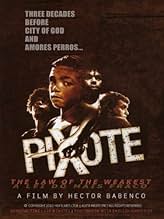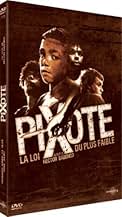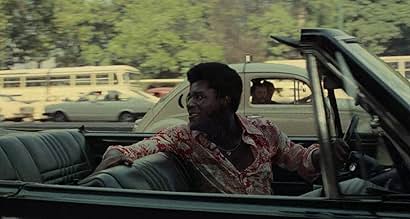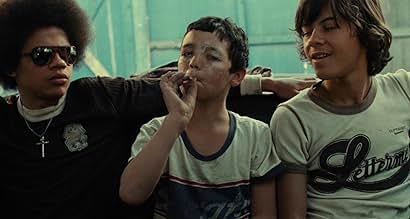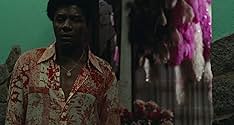IMDb-BEWERTUNG
7,9/10
10.137
IHRE BEWERTUNG
Das Leben eines Jungen in den Straßen von Sao Paulo, der in Verbrechen, Prostitution und Drogen involviert ist.Das Leben eines Jungen in den Straßen von Sao Paulo, der in Verbrechen, Prostitution und Drogen involviert ist.Das Leben eines Jungen in den Straßen von Sao Paulo, der in Verbrechen, Prostitution und Drogen involviert ist.
- Auszeichnungen
- 10 Gewinne & 4 Nominierungen insgesamt
João José Pompeo
- Almir
- (as Joáo José Pompeu)
Rubens Rollo
- Director
- (as Ruben Rollo)
Luis Serra
- Reporter
- (as Luiz Serra)
Empfohlene Bewertungen
This film takes a hard, lingering look at the brutal horrors visited on and enacted by a group of poor kid criminals in Brazil. This is one of the most deeply disturbing movie experiences I've ever had. And yet, it almost felt necessary to continue to watch, to at the very least acknowledge the sorts of situations depicted here as real events that happen to real people. Masterfully made.
Pixote is probably the most powerful film I have ever seen. An aspect so rarely attained in most films is the gritty reality that Babenco exposes with paramount ability and care. It truly will stay with you forever--you will be touched in such a deep way no matter who you are, no matter where you're from, no matter what movie genre you favor.
Considering that Da Silva's own life was one of the streets, leading to an early death at nineteen, when he was killed by corrupt cops in a drug raid, the film becomes all the more disturbing when we realize that Da Silva truly is Pixote in a circle of life imitating art imitating life.
With no reliable source of aide, these street kids are forced to exist at a most extreme disadvantage. The brutal truth in this film may be difficult to digest, but we can't turn a blind eye. Ultimately, words aren't strong enough to do this film justice, you'll have to experience it yourself.
Considering that Da Silva's own life was one of the streets, leading to an early death at nineteen, when he was killed by corrupt cops in a drug raid, the film becomes all the more disturbing when we realize that Da Silva truly is Pixote in a circle of life imitating art imitating life.
With no reliable source of aide, these street kids are forced to exist at a most extreme disadvantage. The brutal truth in this film may be difficult to digest, but we can't turn a blind eye. Ultimately, words aren't strong enough to do this film justice, you'll have to experience it yourself.
Following the robbery homicide of a Brazilian judge by a street gang, the authorities make a sweep of the local street kids in the area and intern them in a young offender's institution. The film is in part a social issue film where the way the children are treated by the system is condemned and in part a story about a young lad who grows old far too soon. The social issue, although maybe broadly relevant, is hardly au courant some three decades after the film was made, however I didn't feel like this detracted much from the film due to the excellent characterisations and strong story line. It's also not limited by the generics of the prison movie as a lot of the action takes place outside the prison walls.
The main character, an extremely small boy, Pixote (pronounced Pichote), is especially winsome and actually played by a real life delinquent who was subsequently shot by police in a shoot-out. He has developed a firmness of independent judgement and level of character that you generally only find in people well into adulthood, something that he's had to do to survive. It's painfully clear at some points though that he is just a skinny little boy that needs his mother.
There is charisma to spare in the acting performances, including a youngster who does an extremely catchy homage to Roberto Carlos (the great Brazilian singer as opposed to football player) for the prison gig, and appears destined for stardom if he can stay alive.
The kids are in peril because the police are beating them to death in order to find out who killed the judge, whilst the incompetent prison authorities turn a blind eye and fall into a state of apathy concerning the well-being of their wards (see no evil, hear no evil, speak no evil).
Babenco appears fascinated by prison culture and in both this film and his return to the genre with Carandiru (2003) he uses nakedness to remind us of the fundamental vulnerability of the human captives in his film. In the poster for Carandiru you can see the survivors of a prison riot lying naked in a yard, stripped of their clothes (in which they could conceal weapons), in Pixote a "hole" packed with naked children. Beaten, unclothed and helpless it's quite easy to connect with the camouflage of swagger and defiance that they need to survive is taken away. Fundamentally a human is a fragile creature that hurts and most of their persona is just a coping strategy.
There's a dream-like feel to a lot of the film, which is often brazenly erotic (the transvestite Lilica dancing in front of a crowd whilst having her under carriage rubbed by an onlooker's raised foot), and anarchical. It's not easy to label the film as nightmarish because some of the experiences, even when negative, are extremely rich, and the friendships heartfelt.
A classic faux pas of many non-Anglo movies is that whenever whites appear, they are cardboard cutouts, but here the old American john is as well-realised and succinctly characterised as he could be.
Favourite scenes of mine include the post-glue-sniffing fascination of Pixote, and the half-lit dormitory riot which is truly mad.
The main character, an extremely small boy, Pixote (pronounced Pichote), is especially winsome and actually played by a real life delinquent who was subsequently shot by police in a shoot-out. He has developed a firmness of independent judgement and level of character that you generally only find in people well into adulthood, something that he's had to do to survive. It's painfully clear at some points though that he is just a skinny little boy that needs his mother.
There is charisma to spare in the acting performances, including a youngster who does an extremely catchy homage to Roberto Carlos (the great Brazilian singer as opposed to football player) for the prison gig, and appears destined for stardom if he can stay alive.
The kids are in peril because the police are beating them to death in order to find out who killed the judge, whilst the incompetent prison authorities turn a blind eye and fall into a state of apathy concerning the well-being of their wards (see no evil, hear no evil, speak no evil).
Babenco appears fascinated by prison culture and in both this film and his return to the genre with Carandiru (2003) he uses nakedness to remind us of the fundamental vulnerability of the human captives in his film. In the poster for Carandiru you can see the survivors of a prison riot lying naked in a yard, stripped of their clothes (in which they could conceal weapons), in Pixote a "hole" packed with naked children. Beaten, unclothed and helpless it's quite easy to connect with the camouflage of swagger and defiance that they need to survive is taken away. Fundamentally a human is a fragile creature that hurts and most of their persona is just a coping strategy.
There's a dream-like feel to a lot of the film, which is often brazenly erotic (the transvestite Lilica dancing in front of a crowd whilst having her under carriage rubbed by an onlooker's raised foot), and anarchical. It's not easy to label the film as nightmarish because some of the experiences, even when negative, are extremely rich, and the friendships heartfelt.
A classic faux pas of many non-Anglo movies is that whenever whites appear, they are cardboard cutouts, but here the old American john is as well-realised and succinctly characterised as he could be.
Favourite scenes of mine include the post-glue-sniffing fascination of Pixote, and the half-lit dormitory riot which is truly mad.
"Pixote: A Lei do Mais Fraco" deals with what is perhaps the greatest of all Brazilian themes: poverty. And along with poverty the other unnatural feelings and actions it brings; prostitution, violence, crime, rape and murder.
Brazil is the country of paradoxes, and its social problems are present everywhere. The difference between the rich and the poor; the beautiful and the ugly; happiness and the most profound human decay.
"Pixote" is one of the films that dare to touch and open these so painful wounds, and does it without the slightest glimmer of hope, in an honest portrayal of a country that, like Pixote himself, is already lost.
Brazil is the country of paradoxes, and its social problems are present everywhere. The difference between the rich and the poor; the beautiful and the ugly; happiness and the most profound human decay.
"Pixote" is one of the films that dare to touch and open these so painful wounds, and does it without the slightest glimmer of hope, in an honest portrayal of a country that, like Pixote himself, is already lost.
The violent death of Fernando Ramos Da Silva only eight years after the completion of this film, only adds to the poignancy of dierector BAbenco's powerful message. The film is split into two halves - the first in a reformatory where a group of youngsters are abused and violated by the violent law enforcers and guardians. The second backdrop is the city where they are confined instead by their own actions and morality, which includes mugging, pimping and killing different characters who enter their lives.
The differing gender and sexual roles in the film allow for constant changes in the characters as they interact with other people. Particularly interesting is teh character of Lalica, a transvestite who is mother and lover to some of the children. Her reaction to the arrival of Sueli, a prostitute is both poignant and tragic.
There is no happy ending to this story and i reccomend to watch it with caution as there are some very uncomfortable scenes to watch especially in teh opening twenty minutes. But whilst watching it, it is important to remember that this is not just a fictional tale. The actors are not trained professionals but instead boys selected from the streetsof Sao Paulo. They actually lived this life that is portrayed so vividly on screen and in da Silva's case, died at the hands of the police who are depicted so brutally. A documentary? A piece of fiction. It borders on both but it certainly makes for heart wrenching material and is a film that actually leaves you breathless and thinking long after having watched it.
10/10
The differing gender and sexual roles in the film allow for constant changes in the characters as they interact with other people. Particularly interesting is teh character of Lalica, a transvestite who is mother and lover to some of the children. Her reaction to the arrival of Sueli, a prostitute is both poignant and tragic.
There is no happy ending to this story and i reccomend to watch it with caution as there are some very uncomfortable scenes to watch especially in teh opening twenty minutes. But whilst watching it, it is important to remember that this is not just a fictional tale. The actors are not trained professionals but instead boys selected from the streetsof Sao Paulo. They actually lived this life that is portrayed so vividly on screen and in da Silva's case, died at the hands of the police who are depicted so brutally. A documentary? A piece of fiction. It borders on both but it certainly makes for heart wrenching material and is a film that actually leaves you breathless and thinking long after having watched it.
10/10
Wusstest du schon
- WissenswertesThe film's star, Fernando Ramos da Silva, who plays a young street criminal, actually was a street criminal before he made this film. After completing it, he took up the criminal life again, and was killed in Brazil in 1987 in an alleged shootout with police. While police reports claim that da Silva was resisting arrest, there are conflicting reports from eyewitnesses, who claim da Silva was unarmed. Furthermore, a forensic examination showed that he had been shot while lying on the ground. Both his wife and mother called the shooting "a police execution." The story of Fernando Ramos da Silva is depicted in the biographical film Quem Matou Pixote? (1996).
- Alternative VersionenAll UK versions were cut by 27 secs under the 1978 Protection of Children Act. The scene removed was a panning shot showing Pixote on a bed alongside a couple having sex.
- VerbindungenFeatured in Sneak Previews: Pixote, Ragtime, Buddy Buddy, Absence of Malice (1981)
- SoundtracksCould It Be Magic
Top-Auswahl
Melde dich zum Bewerten an und greife auf die Watchlist für personalisierte Empfehlungen zu.
- How long is Pixote?Powered by Alexa
Details
Zu dieser Seite beitragen
Bearbeitung vorschlagen oder fehlenden Inhalt hinzufügen

Oberste Lücke
By what name was Pixote - Asphalt-Haie (1980) officially released in India in English?
Antwort


